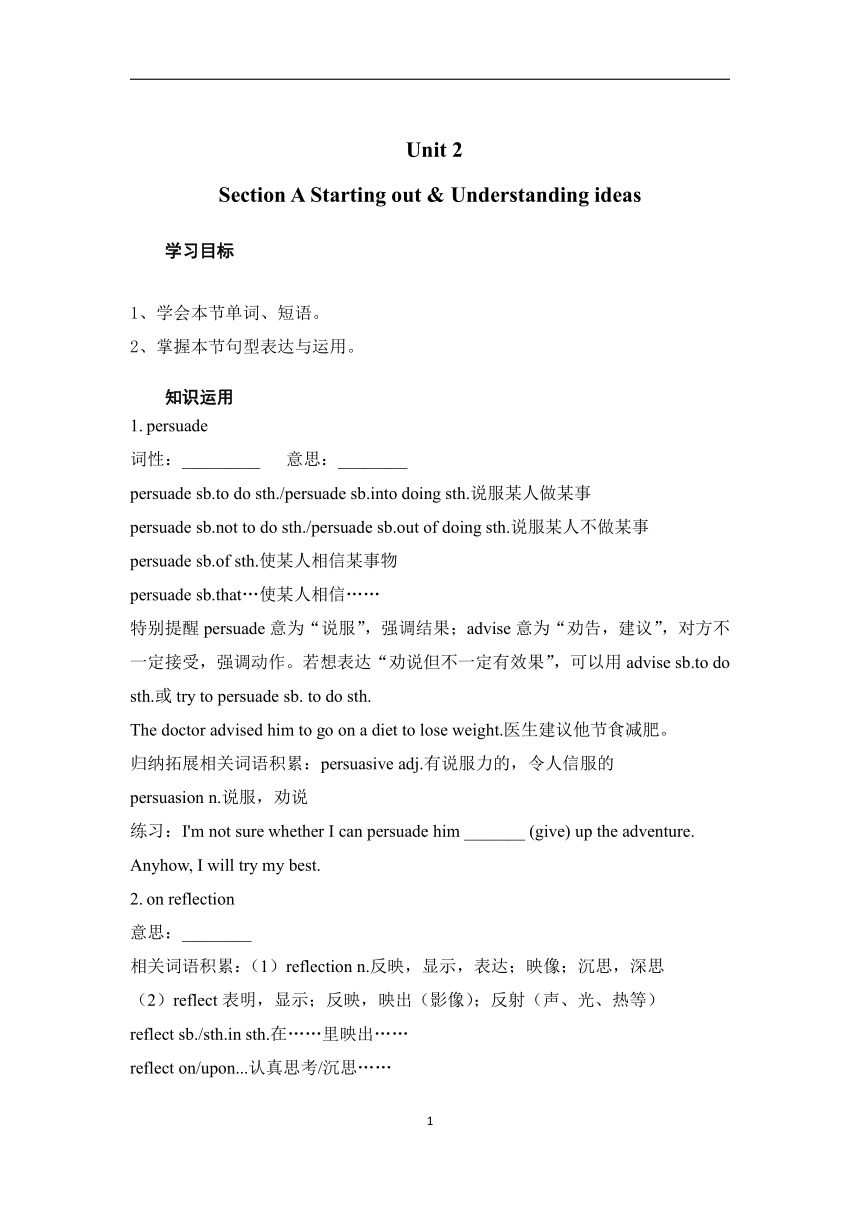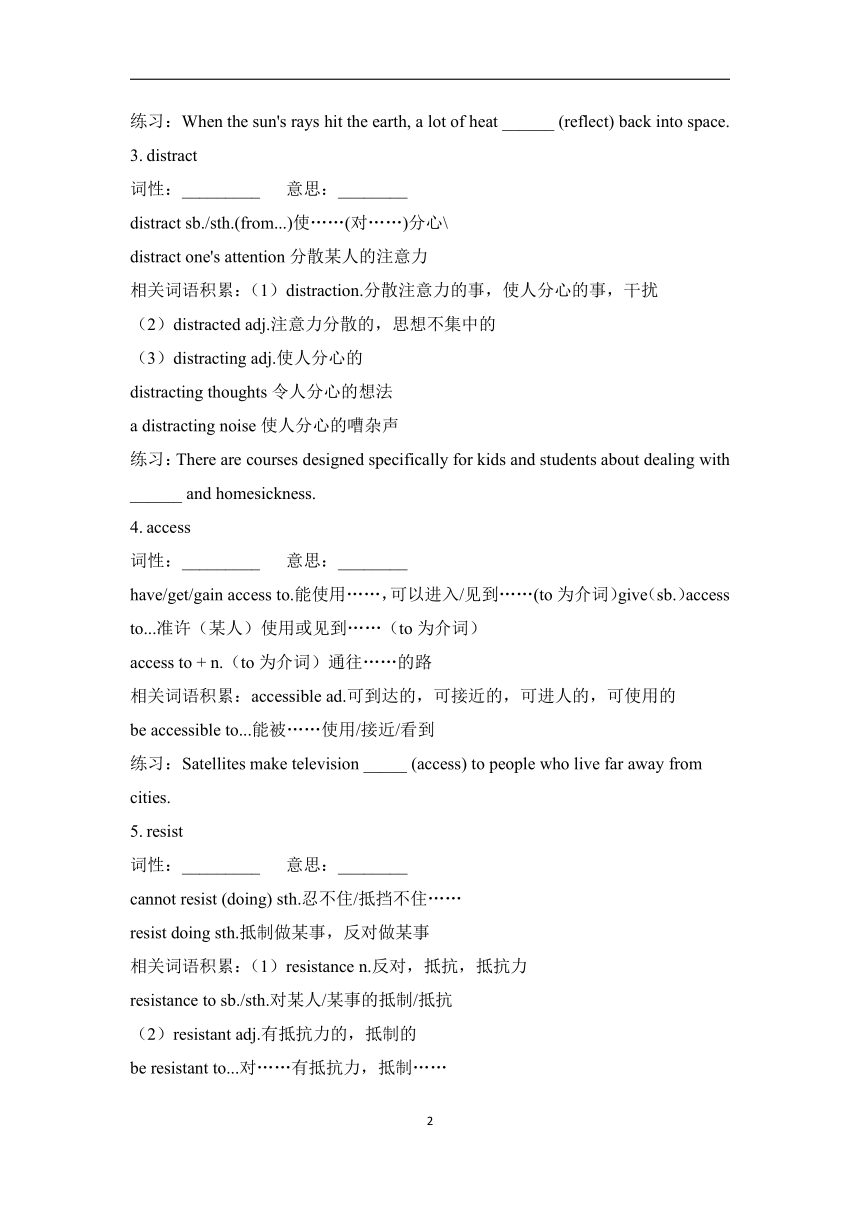外研版(2019)选择性必修第二册Unit 2 Bridging Cultures Section A Starting out & Understanding ideas学案(有答案)
文档属性
| 名称 | 外研版(2019)选择性必修第二册Unit 2 Bridging Cultures Section A Starting out & Understanding ideas学案(有答案) |  | |
| 格式 | docx | ||
| 文件大小 | 25.0KB | ||
| 资源类型 | 教案 | ||
| 版本资源 | 人教版(2019) | ||
| 科目 | 英语 | ||
| 更新时间 | 2022-10-28 16:19:20 | ||
图片预览


文档简介
Unit 2
Section A Starting out & Understanding ideas
学习目标
1、学会本节单词、短语。
2、掌握本节句型表达与运用。
知识运用
1. persuade
词性:_________ 意思:________
persuade sb.to do sth./persuade sb.into doing sth.说服某人做某事
persuade sb.not to do sth./persuade sb.out of doing sth.说服某人不做某事
persuade sb.of sth.使某人相信某事物
persuade sb.that…使某人相信……
特别提醒persuade意为“说服”,强调结果;advise意为“劝告,建议”,对方不一定接受,强调动作。若想表达“劝说但不一定有效果”,可以用advise sb.to do sth.或try to persuade sb. to do sth.
The doctor advised him to go on a diet to lose weight.医生建议他节食减肥。
归纳拓展相关词语积累:persuasive adj.有说服力的,令人信服的
persuasion n.说服,劝说
练习:I'm not sure whether I can persuade him _______ (give) up the adventure. Anyhow, I will try my best.
2. on reflection
意思:________
相关词语积累:(1)reflection n.反映,显示,表达;映像;沉思,深思
(2)reflect表明,显示;反映,映出(影像);反射(声、光、热等)
reflect sb./sth.in sth.在……里映出……
reflect on/upon...认真思考/沉思……
练习:When the sun's rays hit the earth, a lot of heat ______ (reflect) back into space.
3. distract
词性:_________ 意思:________
distract sb./sth.(from...)使……(对……)分心\
distract one's attention分散某人的注意力
相关词语积累:(1)distraction.分散注意力的事,使人分心的事,干扰
(2)distracted adj.注意力分散的,思想不集中的
(3)distracting adj.使人分心的
distracting thoughts令人分心的想法
a distracting noise使人分心的嘈杂声
练习:There are courses designed specifically for kids and students about dealing with ______ and homesickness.
4. access
词性:_________ 意思:________
have/get/gain access to.能使用……,可以进入/见到……(to为介词)give(sb.)access to...准许(某人)使用或见到……(to为介词)
access to + n.(to为介词)通往……的路
相关词语积累:accessible ad.可到达的,可接近的,可进人的,可使用的
be accessible to...能被……使用/接近/看到
练习:Satellites make television _____ (access) to people who live far away from cities.
5. resist
词性:_________ 意思:________
cannot resist (doing) sth.忍不住/抵挡不住……
resist doing sth.抵制做某事,反对做某事
相关词语积累:(1)resistance n.反对,抵抗,抵抗力
resistance to sb./sth.对某人/某事的抵制/抵抗
(2)resistant adj.有抵抗力的,抵制的
be resistant to...对……有抵抗力,抵制……
练习:It’s clear that antibiotics(抗生素) help animals stay healthy in a crowded environment and grow faster. But bacteria can develop_____ (resist) to the drugs gradually.
句型梳理
1. To be honest, I didn't find the detox too difficult, but I did give my phone to my dad to avoid giving in! 老实说,我没觉得戒除社交媒体太难,不过我还是把手机交给了爸爸保管,以防自己屈服于手机的魔力!
句式剖析
本句为并列句,but连接两个并列分句。第二个分句中did用于强调谓语动词give。考点提炼
"do/does/did+动词原形" 结构
(1)强调谓语动词时,在动词原形前加助动词do, does或did, do/does/did 可译为“的确,确实,真的”。
(2)这种强调结构只用于一般现在时和一般过去时两种时态,且只用于肯定句中。
(3)do/does用于一般现在时,did用于一般过去时;do用于第一、第二人称和第三人称复数,does用于第三人称单数,did用于各种人称。
He does like eating noodles.他真的喜欢吃面条。
They do work hard at maths.他们学习数学确实很努力。
He did have a good time last night.他昨天晚上的确玩得很开心。
特别提醒
若强调主语、宾语、表语、状语等,则应用强调句型"It is/was…that/who.."。
2. An hour's sport each day left me tired out and sent me early to bed.
每天一小时的运动使我疲惫不堪,早早就寝。
句式剖析
本句为简单句,句中的left me tired out 属于"leave+宾语+宾补"结构。
考点提炼
"leave +宾语+宾补"结构
在该结构中leave 表示让……处于(某种状态),“leave+宾语+宾补”结构的常见形式:
(1)leave+宾语+形容词/副词/介词短语。形容词/副词/介词短语通常表示状态。
He got up late and hurried to his office, leaving the breakfast untouched.
他起床晚了,匆匆赶往办公室,早餐动都没动。
Don't leave the computer on when you go out.你出去时别让计算机一直开着。
He hurried home, leaving his keys in the office.他匆忙赶回家,把钥匙忘在了办公室。
(2)leave+宾语+v-ing(短语)。v-ing(短语)通常表示动作或状态的持续。
Kate's sudden leaving left us all wondering what was going to happen.
凯特的突然离开使我们大家都想知道将要发生什么事。
(3)leave+宾语+v-ed(短语)。v-ed(短语)通常表示动作的完成或状态,其中宾语与构成v-ed的动词之间通常为逻辑上的动宾关系。
You can't just leave the work half done and go back home.
你不能把工作做了一半就回家。
(4)leave+宾语+名词。名词多表示一种结果。
His parents died two years ago, leaving him an orphan.
他的父母两年前去世了,他成了一个孤儿。
答案
知识运用
1.to give 2.is reflected 3.distraction(s) 4.accessible 5.resistance
2
Section A Starting out & Understanding ideas
学习目标
1、学会本节单词、短语。
2、掌握本节句型表达与运用。
知识运用
1. persuade
词性:_________ 意思:________
persuade sb.to do sth./persuade sb.into doing sth.说服某人做某事
persuade sb.not to do sth./persuade sb.out of doing sth.说服某人不做某事
persuade sb.of sth.使某人相信某事物
persuade sb.that…使某人相信……
特别提醒persuade意为“说服”,强调结果;advise意为“劝告,建议”,对方不一定接受,强调动作。若想表达“劝说但不一定有效果”,可以用advise sb.to do sth.或try to persuade sb. to do sth.
The doctor advised him to go on a diet to lose weight.医生建议他节食减肥。
归纳拓展相关词语积累:persuasive adj.有说服力的,令人信服的
persuasion n.说服,劝说
练习:I'm not sure whether I can persuade him _______ (give) up the adventure. Anyhow, I will try my best.
2. on reflection
意思:________
相关词语积累:(1)reflection n.反映,显示,表达;映像;沉思,深思
(2)reflect表明,显示;反映,映出(影像);反射(声、光、热等)
reflect sb./sth.in sth.在……里映出……
reflect on/upon...认真思考/沉思……
练习:When the sun's rays hit the earth, a lot of heat ______ (reflect) back into space.
3. distract
词性:_________ 意思:________
distract sb./sth.(from...)使……(对……)分心\
distract one's attention分散某人的注意力
相关词语积累:(1)distraction.分散注意力的事,使人分心的事,干扰
(2)distracted adj.注意力分散的,思想不集中的
(3)distracting adj.使人分心的
distracting thoughts令人分心的想法
a distracting noise使人分心的嘈杂声
练习:There are courses designed specifically for kids and students about dealing with ______ and homesickness.
4. access
词性:_________ 意思:________
have/get/gain access to.能使用……,可以进入/见到……(to为介词)give(sb.)access to...准许(某人)使用或见到……(to为介词)
access to + n.(to为介词)通往……的路
相关词语积累:accessible ad.可到达的,可接近的,可进人的,可使用的
be accessible to...能被……使用/接近/看到
练习:Satellites make television _____ (access) to people who live far away from cities.
5. resist
词性:_________ 意思:________
cannot resist (doing) sth.忍不住/抵挡不住……
resist doing sth.抵制做某事,反对做某事
相关词语积累:(1)resistance n.反对,抵抗,抵抗力
resistance to sb./sth.对某人/某事的抵制/抵抗
(2)resistant adj.有抵抗力的,抵制的
be resistant to...对……有抵抗力,抵制……
练习:It’s clear that antibiotics(抗生素) help animals stay healthy in a crowded environment and grow faster. But bacteria can develop_____ (resist) to the drugs gradually.
句型梳理
1. To be honest, I didn't find the detox too difficult, but I did give my phone to my dad to avoid giving in! 老实说,我没觉得戒除社交媒体太难,不过我还是把手机交给了爸爸保管,以防自己屈服于手机的魔力!
句式剖析
本句为并列句,but连接两个并列分句。第二个分句中did用于强调谓语动词give。考点提炼
"do/does/did+动词原形" 结构
(1)强调谓语动词时,在动词原形前加助动词do, does或did, do/does/did 可译为“的确,确实,真的”。
(2)这种强调结构只用于一般现在时和一般过去时两种时态,且只用于肯定句中。
(3)do/does用于一般现在时,did用于一般过去时;do用于第一、第二人称和第三人称复数,does用于第三人称单数,did用于各种人称。
He does like eating noodles.他真的喜欢吃面条。
They do work hard at maths.他们学习数学确实很努力。
He did have a good time last night.他昨天晚上的确玩得很开心。
特别提醒
若强调主语、宾语、表语、状语等,则应用强调句型"It is/was…that/who.."。
2. An hour's sport each day left me tired out and sent me early to bed.
每天一小时的运动使我疲惫不堪,早早就寝。
句式剖析
本句为简单句,句中的left me tired out 属于"leave+宾语+宾补"结构。
考点提炼
"leave +宾语+宾补"结构
在该结构中leave 表示让……处于(某种状态),“leave+宾语+宾补”结构的常见形式:
(1)leave+宾语+形容词/副词/介词短语。形容词/副词/介词短语通常表示状态。
He got up late and hurried to his office, leaving the breakfast untouched.
他起床晚了,匆匆赶往办公室,早餐动都没动。
Don't leave the computer on when you go out.你出去时别让计算机一直开着。
He hurried home, leaving his keys in the office.他匆忙赶回家,把钥匙忘在了办公室。
(2)leave+宾语+v-ing(短语)。v-ing(短语)通常表示动作或状态的持续。
Kate's sudden leaving left us all wondering what was going to happen.
凯特的突然离开使我们大家都想知道将要发生什么事。
(3)leave+宾语+v-ed(短语)。v-ed(短语)通常表示动作的完成或状态,其中宾语与构成v-ed的动词之间通常为逻辑上的动宾关系。
You can't just leave the work half done and go back home.
你不能把工作做了一半就回家。
(4)leave+宾语+名词。名词多表示一种结果。
His parents died two years ago, leaving him an orphan.
他的父母两年前去世了,他成了一个孤儿。
答案
知识运用
1.to give 2.is reflected 3.distraction(s) 4.accessible 5.resistance
2
